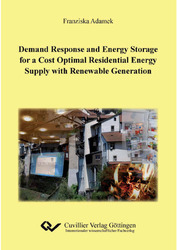| Fachbereiche | |
|---|---|
| Buchreihen (96) |
1381
|
| Nachhaltigkeit |
3
|
| Gesundheitswesen |
1
|
| Geisteswissenschaften |
2370
|
| Naturwissenschaften |
5408
|
| Mathematik | 229 |
| Informatik | 319 |
| Physik | 980 |
| Chemie | 1364 |
| Geowissenschaften | 131 |
| Humanmedizin | 243 |
| Zahn-, Mund- und Kieferheilkunde | 10 |
| Veterinärmedizin | 108 |
| Pharmazie | 147 |
| Biologie | 835 |
| Biochemie, Molekularbiologie, Gentechnologie | 121 |
| Biophysik | 25 |
| Ernährungs- und Haushaltswissenschaften | 45 |
| Land- und Agrarwissenschaften | 1005 |
| Forstwissenschaften | 201 |
| Gartenbauwissenschaft | 20 |
| Umweltforschung, Ökologie und Landespflege | 148 |
| Ingenieurwissenschaften |
1795
|
| Allgemein |
98
|
|
Leitlinien Unfallchirurgie
5. Auflage bestellen |
|
Erweiterte Suche
Demand Response and Energy Storage for a Cost Optimal Residential Energy Supply with Renewable Generation
Franziska Adamek (Autor)Vorschau
Inhaltsverzeichnis, Datei (42 KB)
Leseprobe, Datei (120 KB)
Renewable energy generation has been increasing for years, and is
likely to increase even more in the future. Private households contribute to the increase of renewable generation for example with the installation of roof-mounted photovoltaic plants. Owners are interested in making the most out of their local resources to keep energy costs as low as possible. To reach this aim, a household can apply energy storage and the change of load demand, also called demand response, or cooperate with other houses in the vicinity by sharing renewable generation and coordinating load demand to minimize the collective energy costs.
The aim of this thesis is to examine the influence of energy storage and demand response on domestic energy costs in the residential sector. Special focus is put on the influence of both on the energy supply strategy and the resulting energy costs. It is also examined whether additional benefits arise from a combination of demand response and energy storage, and if a cooperation between a group of houses can increase the overall welfare compared to individual energy supply.
This work considers a single-family house in moderate climate and one in hot climate as well as a group of houses in moderate climate to examine the topics presented above. The required heating or cooling power and energy as well as warm water and electricity have to be provided by a number of conversion and storage technologies. The devices are aggregated in a multi-energy hub and coordinated such that they best exploit the available renewable resources and variable energy prices to minimize the household’s energy costs. An energy hub is a device that models the processing (conversion and storage) of various energy carriers, both conventional and renewable, to determine the optimal power supply for a given load demand.
For a group of six houses, a multiple-level approach is proposed to model the interdependencies and the cooperation of the actors. The two cases of coexistence and cooperation are compared for the group of houses. In the first case, each actor defines its own energy supply strategy, in the latter case the houses share excess electricity and information about demand response and energy storage use to increase common benefits.
The results show that in moderate climate electric demand response is without large influence on energy costs. Also, an electrical domestic hot water tank allows larger cost savings than an electric storage device. In hot climate, it is the other way round. Electric demand response is well suited to decrease costs, as well as an electric storage device. In both climate zones, the combination of demand response and energy storage is only beneficial if sufficient renewable excess electricity is available and load demand is high enough. A cooperation of a number of households is only beneficial and expedient if the renewable generation sites are concentrated in few places. As a consequence of the obtained results, single-family houses in moderate climate are recommended to use excess electricity for thermal load demand, while houses in hot climate should invest in small electric storage devices. In a group of houses, energy storage is best installed such that it supplies a number of houses, while renewable resources should be exploited individually.
| ISBN-13 (Printausgabe) | 386955939X |
| ISBN-13 (Printausgabe) | 9783869559391 |
| ISBN-13 (E-Book) | 9783736939394 |
| Buchendformat | A5 |
| Sprache | Englisch |
| Seitenanzahl | 184 |
| Umschlagkaschierung | matt |
| Auflage | 1 Aufl. |
| Band | 0 |
| Erscheinungsort | Göttingen |
| Promotionsort | Zürich |
| Erscheinungsdatum | 28.11.2011 |
| Allgemeine Einordnung | Dissertation |
| Fachbereiche |
Physik
Elektrotechnik |








